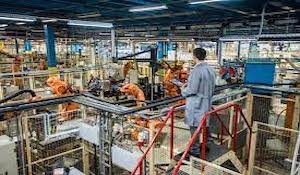Best Manufacturing ERP Software: Manufacturing Costing and Valuation
Why is Manufacturing Costing and Inventory Valuation Part of ERP Software Selection? The process of evaluating and selecting a new distribution or...
4 min read
 Murray Quibell
Mar 6, 2023 9:55:56 AM
Murray Quibell
Mar 6, 2023 9:55:56 AM

Manufacturing processes vary by industry, and whether you deal with finished goods, or raw materials, you may need to adapt to specific operations, market conditions, customer preferences and other factors. Traditionally, manufacturers deployed singular methods of manufacturing, either process or discrete. This is partly due to the nature of their business and past limitations with legacy ERP business software. For example, most make-to-stock and make-to-order manufacturers employ a V-model manufacturing process where multiple raw materials result in a single finished good. Conversely, remanufacturing and some batch process manufacturers use an A-model process, in which a single raw material produces multiple finished goods.
However, times are changing, and manufacturers leverage multiple concurrent manufacturing modes. This dramatic market shift is necessary to compete in today’s digital world to meet demanding consumer and business customer needs. Further, modern ERP applications, additive manufacturing technologies, artificial intelligence with machine learning, and other advances continue to force manufacturers to reinvent business processes and go-to-market strategies.
Selecting an ERP manufacturing management and accounting
system to run your business is a decision that will affect your
company for many years. Many products offer the same or similar
features and it can be confusing to sort out what’s important and
what’s not. Hopefully, this document will help!
Recent supply chain disruptions also impacted how manufacturers use their business systems to manage manufacturing processes. For example, many manufacturers responded by acquiring smaller suppliers to fortify their supply chains by bringing critical supplies in-house. However, many of the related products require drastically different methods of manufacturing.
Manufacturers leverage modern ERP systems to connect commerce applications for direct-to-consumer (D2C) and online business-to-business (B2B) sales and go-to-market strategies that enable job shops to develop standard product lines to fuel growth.
Manufacturing methods comprise a vital component of every manufacturing ERP business system. Some systems provide robust inventory and warehouse management capabilities to forecast demand and manage considerable inventories in make-to-stock environments. Other ERP systems provide deep engineering and design features for engineer-to-order manufacturers. Specialized ERP applications are designed for food, chemical, and other manufacturers with batch process requirements based on recipes and formulas.
This eBook identifies the industry trends impacting manufacturing strategies and business application features commonly found in ERP systems designed for each manufacturing method. Discover how to capitalize on modern technologies to adapt to changing customer requirements, fortify your supply chain, and boost sales by introducing innovative products in new markets.
Multi-modal manufacturing is not a new concept. Many manufacturers have offered varied product lines requiring different manufacturing methods for decades. However, recent trends force traditionally monolithic manufacturers to adopt alternative manufacturing methods. These trends include personalized products, shorter lead times, and innovative products that are stronger and easier to produce.
Personalized Products
A 2019 Deloitte study claims that more than 50% of customers want personalized or custom products. Customization trends drive traditional make-to-stock manufacturers to offer personalized products through commerce storefronts or 3D printers.
Supply Chain Concerns
The unprecedented COVID pandemic and recent civil unrest illuminated problems with global supply chains. Manufacturers reacted by returning to on-shore production with customized product offerings. Customers are willing to pay a premium for faster and more reliable order fulfillment. Traditional make-to-stock manufacturers leverage technology to offer entirely new product lines. Job shops and other make-to-order manufacturers now deploy commerce sites to launch their own standard product lines.
Modern Technology
Rules-based product configurators appeared decades ago. However, integration with consumer-facing platforms, like commerce storefronts, brings new opportunities to consumers and businesses looking for tailored products.
Other Trends
Labour shortages forced manufacturers to invest in technology to streamline production. Smart factory advances include new manufacturing methods to augment labour-intensive processes. COVID forced workers into home offices in droves. While COVID concerns wane, many workers remain in home offices. Smart home and office technology manufacturers responded with installation services requiring project-driven manufacturing strategies. Demand for home delivery and subscription services opens new doors to expand product lines that require varied manufacturing methods.
Lean Strategies for Multi-Modal Manufacturing
Some people believe lean manufacturing is a distinct method of manufacturing. At the same time, lean strategies impact manufacturing processes and business systems but are best classified as a strategy that applies to many manufacturing methods. Lean manufacturing focuses on minimizing waste and maximizing productivity within manufacturing systems. Waste is viewed as anything that does not add value to the product or the process. Lean manufacturing benefits include reduced lead times, lower operating costs, and improved product quality.
Multi-Modal Manufacturing Impacts ERP Software
Historically, most legacy ERP systems were developed for niche manufacturing markets requiring a single manufacturing method. While many manufacturers use multiple manufacturing methods today, few ERP applications are adapted for multi-modal manufacturing. For example, most ERP systems are either discrete or process, rarely both. Further, many make-to-order and job shop systems on the market lack robust inventory and native warehouse management required by make-to-stock manufacturers. Likewise, few engineer-to-order or configure-to-order systems offer robust inventory management, demand forecasting, or warehouse management required by make-to-stock companies. Implementation of multiple manufacturing methods impacts ERP configuration and employee training. Making changes to the system for one manufacturing method may impact other methods. Further, the unit of measure setup and conversion in discrete manufacturing methods are not designed for batch process manufacturing scenarios. Consequently, talk to vendors, consultants, and value-added resellers to understand specific requirements for each method of manufacturing supported in your ERP system and learn how to use them effectively.
Choose a Future-Proof ERP Application for Multi-Modal Manufacturing
Limited legacy ERP support for multi-modal manufacturing creates roadblocks for direct-to-consumer markets. Companies struggle to retrofit legacy ERP systems for multiple manufacturing methods, often resulting in disparate ERP deployments—especially in mixed-mode environments.
Conversely, modern ERP systems like Acumatica provide a singular platform for multi-modal manufacturing with native commerce connectors to expand into new channels.
Built on a future-proof cloud platform with native artificial intelligence and machine learning, Acumatica provides unparalleled manufacturing depth with robust financials, native customer relationship management, and powerful business intelligence applications.
Boost sales, maximize resources, automate business processes, and improve profits with best-in-class applications for production, estimating, engineering, material planning, scheduling, product configuration, and manufacturing data collection.

Why is Manufacturing Costing and Inventory Valuation Part of ERP Software Selection? The process of evaluating and selecting a new distribution or...

1 min read
Improve Manufacturing Management by Enhancing Quality Control Ensuring high product quality is crucial for the success of wholesale distributors,...